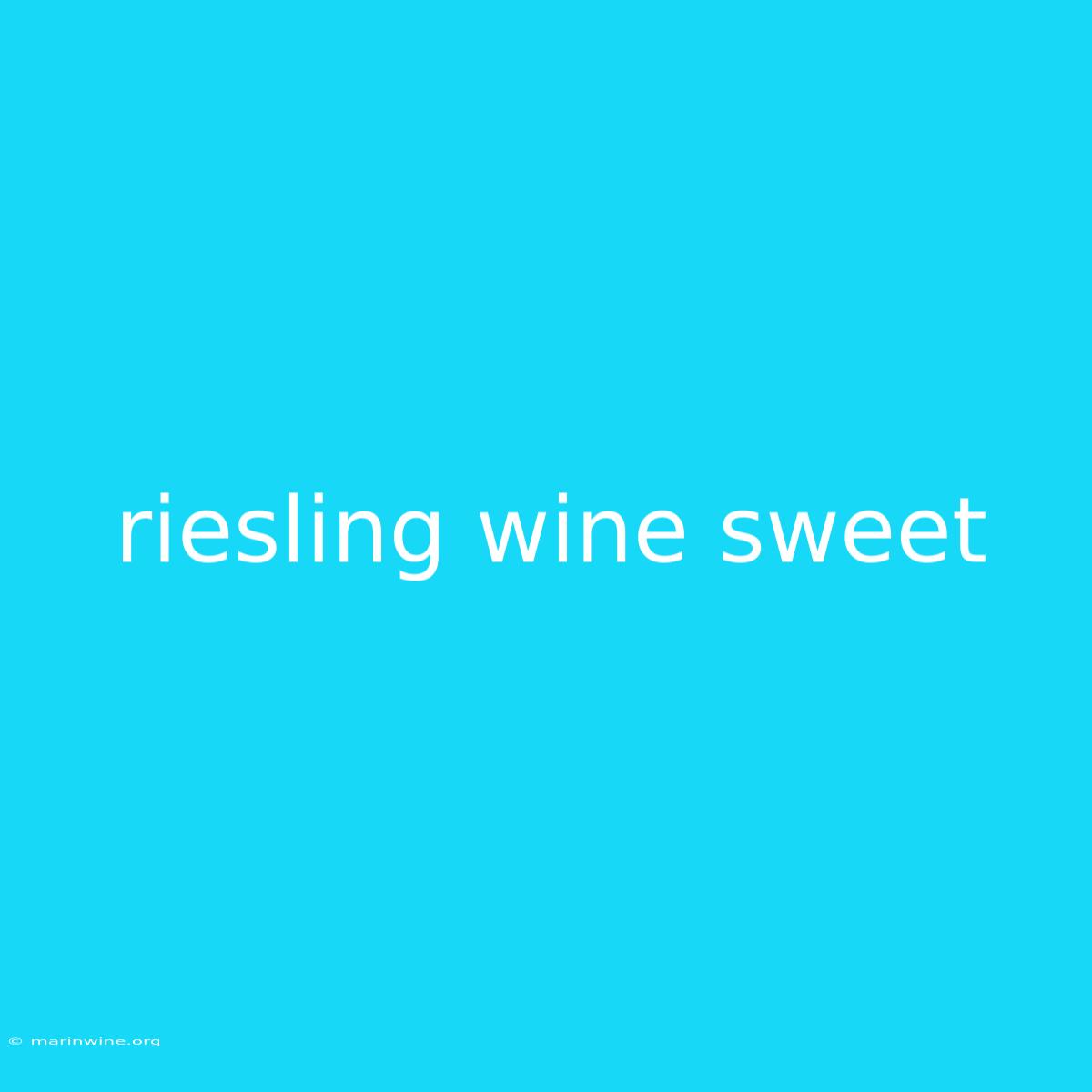Uncorking the Sweetness: A Journey into Riesling Wine
Have you ever wondered why some Rieslings are bone-dry, while others are deliciously sweet? The answer lies in the unique characteristics of this versatile grape and the artistry of winemakers. This article explores the world of sweet Riesling wines, revealing the secrets behind their captivating sweetness and why they deserve a place in your wine cellar.
Why It Matters
Sweet Riesling wines are a delightful departure from the standard dry whites. Their subtle sweetness offers a refreshing contrast to the often austere dryness of other varietals, making them perfect for those seeking a more approachable and enjoyable experience. This article delves into the intricacies of Riesling's sweetness, examining the factors that contribute to its unique flavor profile and highlighting its role in the world of wine.
Key Takeaways of Sweet Riesling Wine:
| Key Takeaway | Explanation |
|---|---|
| Residual Sugar | The amount of sugar remaining in the wine after fermentation. |
| Botrytis | A noble rot that concentrates sugars and flavors in the grapes. |
| Terroir | The specific environment where the grapes are grown, influencing sweetness. |
| Winemaking Style | Techniques like late harvest and ice wine enhance sweetness. |
Riesling: A Grape with a Sweet Side
Riesling, a grape known for its versatility, is capable of producing a wide spectrum of wines, ranging from bone-dry to lusciously sweet. This adaptability is rooted in the grape's unique combination of high acidity and natural sugar content.
Key Aspects of Riesling:
- High Acidity: This characteristic balances out the sweetness, preventing it from becoming cloying or overwhelming.
- Aromatic Intensity: Riesling wines are known for their complex aromas, including notes of citrus, stone fruits, and floral hints.
- Varied Styles: From dry and crisp to sweet and luscious, Riesling offers a diverse range of styles to satisfy every palate.
Unlocking the Secrets of Sweetness
The sweetness in Riesling wines is primarily determined by the amount of residual sugar left after fermentation. While dry Rieslings typically have very low residual sugar, sweet Rieslings retain a significant amount, contributing to their rich and balanced flavor profile.
Residual Sugar:
- Fermentation: The yeast converts sugar into alcohol during fermentation.
- Residual Sugar: The amount of sugar that remains unfermented dictates the wine's sweetness.
- Balancing Act: The high acidity of Riesling balances the sweetness, creating a refreshing and harmonious experience.
Botrytis: The Noble Rot
Botrytis cinerea, also known as noble rot, is a mold that can infect Riesling grapes, concentrating their sugars and enhancing their flavors. This process creates incredibly sweet wines with a unique character.
Botrytis:
- Concentration: Botrytis causes water to evaporate from the grapes, concentrating the sugars and flavors.
- Honeyed Notes: These wines often exhibit intense honeyed, apricot, and quince flavors.
- Rarity: Botrytis infection is unpredictable, making these wines highly sought after.
Terroir: The Influence of Place
The specific location where Riesling grapes are grown plays a crucial role in influencing their sweetness. Climate, soil type, and elevation all contribute to the final flavor profile of the wine.
Terroir:
- Climate: Warmer regions tend to produce riper grapes with higher sugar levels, resulting in sweeter wines.
- Soil: Sandy soils promote drainage, leading to concentrated sugars.
- Elevation: Higher elevations can lead to cooler temperatures and slower ripening, enhancing acidity and sweetness.
Winemaking Styles: Crafting Sweetness
Winemakers employ various techniques to create sweet Riesling wines, including late harvest and ice wine production. These methods further enhance the sweetness and complexity of the final product.
Winemaking Styles:
- Late Harvest: Grapes are harvested later in the season, after they have reached peak ripeness and sugar concentration.
- Ice Wine: Grapes are harvested when frozen, allowing the concentrated juice to be extracted.
- Sweetening: Some winemakers add sugar to the wine after fermentation to enhance sweetness.
Exploring the World of Sweet Riesling
Sweet Riesling wines offer a captivating experience for those seeking a departure from traditional dry wines. Their subtle sweetness, paired with vibrant acidity and complex aromas, makes them a delight to enjoy.
Examples of Sweet Riesling:
- Mosel Riesling: Known for their delicate sweetness and elegant minerality.
- Alsace Riesling: Often full-bodied and aromatic, showcasing intense fruit flavors.
- Australian Riesling: Known for their bold sweetness and fruit-forward character.
FAQ for Sweet Riesling Wine
Q: How sweet are sweet Riesling wines? A: Sweetness levels vary significantly, ranging from slightly off-dry to lusciously sweet.
Q: What food pairings work well with sweet Riesling? A: Pair them with spicy dishes, rich desserts, and cheeses.
Q: Are all Riesling wines sweet? A: No, Riesling can be made in a variety of styles, including dry, semi-dry, and sweet.
Q: What makes Riesling different from other white wines? A: Its high acidity, aromatic intensity, and versatility make it unique.
Q: Where can I find sweet Riesling wines? A: Look for them in wine shops and specialty stores.
Tips for Enjoying Sweet Riesling
- Chill it: Sweet Riesling is best enjoyed chilled.
- Pair it with food: Explore various food pairings to enhance the wine's flavors.
- Explore different styles: Experiment with various regions and producers to discover your favorites.
- Drink it young: Sweet Riesling wines are often best enjoyed within a few years of their vintage.
- Share with friends: Sweet Riesling is a great wine for sharing with friends and family.
Summary of Sweet Riesling Wine
Sweet Riesling wines are a delightful and versatile category, offering a unique combination of sweetness, acidity, and complex aromas. From the delicate sweetness of Mosel Riesling to the bold fruitiness of Australian Riesling, there is a sweet Riesling for every palate. As you embark on your journey through the world of Riesling, remember to explore the different styles, appreciate the influence of terroir, and embrace the captivating sweetness that makes this grape so special.

